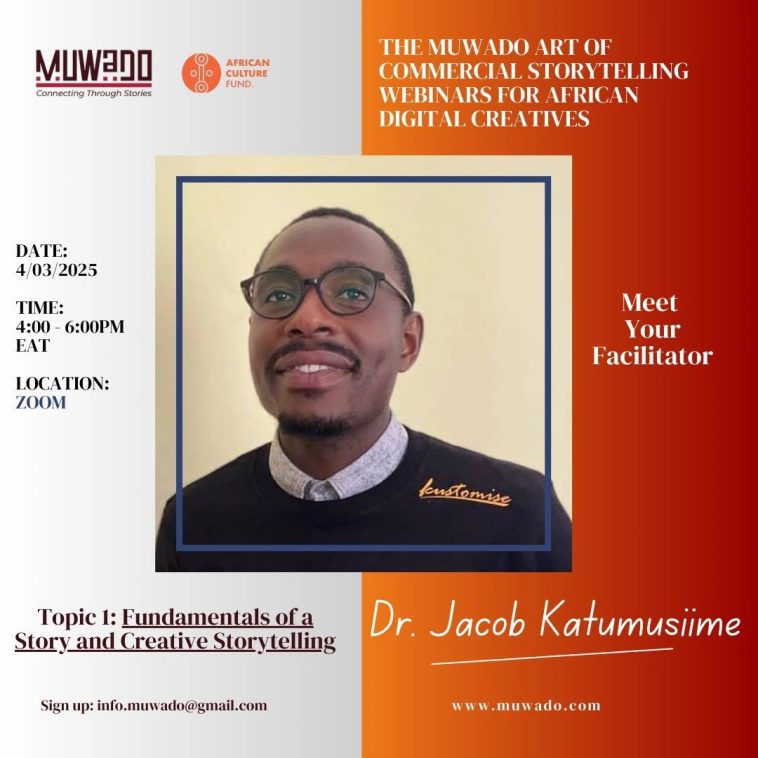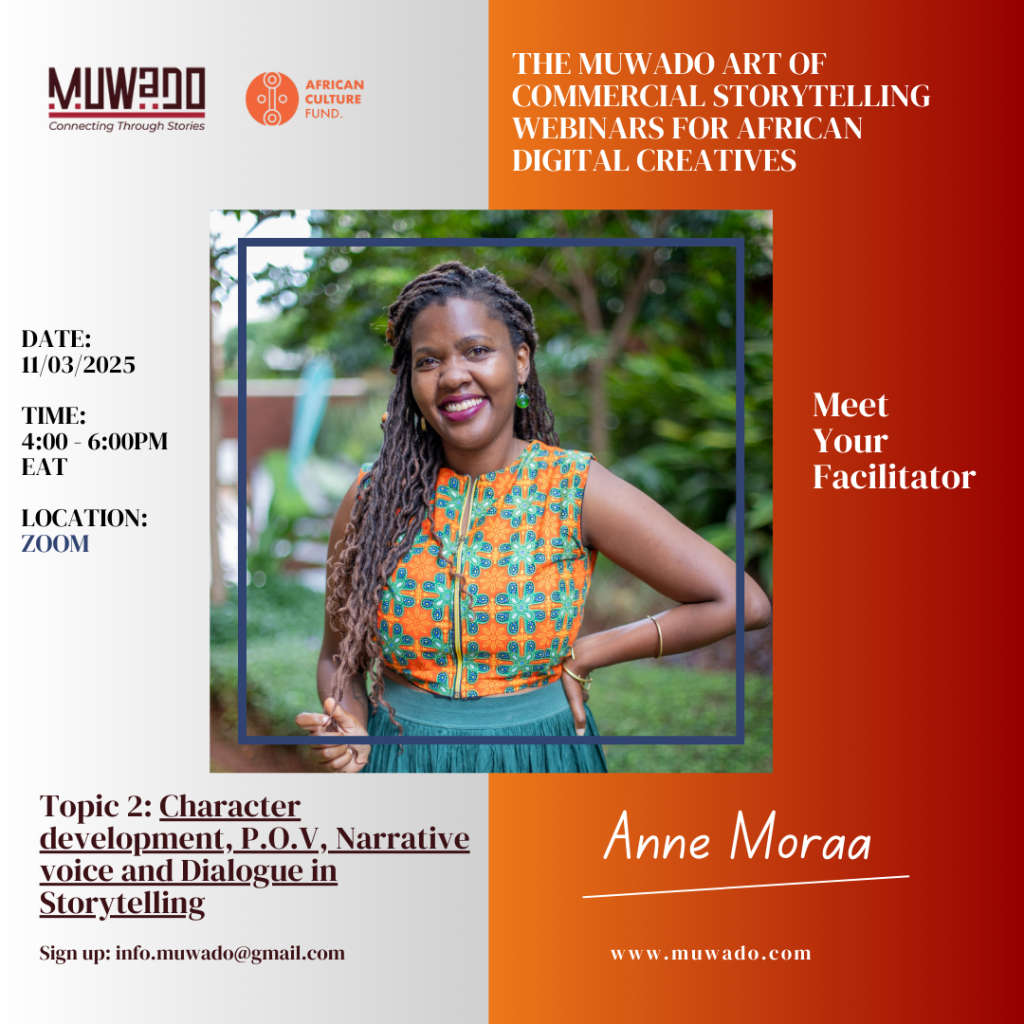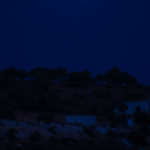We kicked off the Muwado Commercial Storytelling Webinars on Tuesday, 4th March, with Dr.Jacob Katumusiime as our facilitator speaking on – FUNDAMENTALS OF A STORY AND CREATIVE STORYTELLING.
SUMMARY:
Quick recap
The meeting focused on discussing the first session of the Muwado Commercial Storytelling Webinars, with a particular emphasis on African storytelling and commercial aspects. Jacob led a discussion on creative storytelling, the challenges of balancing it with financial stability, and the importance of purposeful storytelling. The meeting also explored the role and identity of African storytellers, with Roland and Jacob discussing the challenges of balancing personal convictions with the need for financial stability.
Next steps
• All participants to read the 40-page book “8 Letters to a Young Writer” by Teju Cole.
• All participants to write a 3-5 page letter to themselves as a storyteller.
• All participants to post their letter on the Muwado platform.
• All participants to join the Muwado group for sharing and feedback.
Summary
Muwado Webinar Launch Meeting
The Muwado introduced the Muwado platform, emphasising its focus on African storytelling and commercial aspects. Jacob, the facilitator for the session, was introduced.
African Digital Creatives & Storytelling
Jacob, a former literature teacher now focusing on political and cultural studies, discussed the concept of creative storytelling, particularly among African digital creatives. He emphasized that there are no universal fundamentals of storytelling, as they are shaped by the context and experiences of the storyteller. Jacob also shared a personal anecdote about Uganda’s 2021 Presidential election, where Facebook was a significant platform for dissent until it was shut down by the government. He noted how different platforms like Twitter and Facebook influenced the dynamics of storytelling and how they are continually evolving.
Balancing Creativity and Financial Stability
Jacob discussed the ongoing search for storytelling fundamentals and the challenges of balancing creative storytelling with the need for financial stability. He raised questions about the purpose of storytelling, what it means to different people, and how it fits into their lives. Jacob also highlighted the pressure to produce money and the challenge of maintaining a creative focus amidst these demands. He emphasized the need to address these issues to protect and nurture storytelling.
Joseph Kibwetere’s Religious Movement Tragedy
Jacob discusses his PhD thesis on Joseph Kibwetere’s religious movement and its tragic end in 2000. He explains his approach to writing the thesis as a chronological narrative, aiming to make it read like a novel while maintaining academic rigor. Jacob then reflects on the challenges of balancing creative storytelling with financial pressures, expressing concern about untold or poorly told stories due to monetary motivations. He criticizes the Ugandan comedy industry for relying on vulgar and tribalistic content for profit. Jacob emphasizes the importance of purposeful storytelling and making meaning out of the world, suggesting that those who focus on this tend to have more enduring influence than those who solely chase financial gain through social media.
8 Letters to a Young Writer
Jacob lead a discussion of “8 Letters to a Young Writer” by Teju Cole. The group read through the preface and eight suggestions for writers, with different participants volunteering to read sections aloud. The suggestions cover topics like using simple language, avoiding cliches and adverbs, reading extensively, relying on observation, being courageous in subject matter, and creating multi-layered narratives. The author emphasizes the importance of dedication and passion in pursuing writing as a vocation.
Metaphors in Writing and Storytelling
Jacob led a discussion on writing, emphasizing the importance of storytelling and the use of metaphors to create multiple meanings in writing. He cited the Bible as an example of a text that has led to the evolution of many religious movements due to its metaphorical content. Jacob also mentioned Zimbabwean writer Dambudzo Marechera, known for his concise and powerful storytelling style. He encouraged participants to test their own writing by seeing if they want to revisit their stories. The conversation ended with an invitation for participants to ask questions.
African Storytellers’ Role and Identity
Jacob discussed the role and identity of African storytellers after a suggestion that African storytellers should not be defined by others, but rather by their own experiences. Jacob emphasized the importance of the purpose behind telling a story, whether it be to expose injustices or to heal and inspire others. The challenges and problems faced by different African countries are similar, and that these experiences should be shared through storytelling.
Balancing Beliefs With Financial Stability
Jacob discussed the challenges of balancing personal convictions with the need for financial stability. Jacob acknowledged his privileged position as a writer and shared his experiences, highlighting the importance of striking a balance between personal beliefs and career demands. He emphasized that the motivation to write often stems from a sense of urgency or passion, and suggested that writers should not solely rely on writing as their source of income. Unity from Namibia asked Jacob about his approach to writing, and Jacob responded by stating that he writes for himself and aims to produce content that he would enjoy reading.
Natural Hair and Cultural Biases
In the meeting, Joshua, a hairstylist and marketer, discussed his article on cultural and religious biases against natural hair, drawing parallels with the Ethiopian culture. He sought advice on breaking the story into parts or presenting it whole, and converting it into an ebook to be sold at events. Jacob suggested that Joshua could tell his story in a similar way to Mukyala Wandera, who gained a large following by sharing short narrations about Ugandan court cases. Jacob also advised Joshua to consider monetizing his story and suggested reaching out to cultural funders or publishers for support.
Exercise: Writing a Letter to Oneself
Jacob gave participants an exercise to complete before the next webinar. Jacob clarifies that the exercise involves writing a 3-5 page letter to oneself as a writer/storyteller and post their letters on the Muwado platform and join the group there to share feedback. Jacob recommends reading the full 40-page booklet first and optionally writing a review of the book.
The session ended with a Q&A about the Muwado platform.
Next steps from that session are:
• All participants to read the 40-page book “8 Letters to a Young Writer” by Teju Cole.
• All participants to write a letter to themselves as a storyteller based off their learnings from the book.
• All participants to post their letter on the Muwado platform (https://muwado.com/create)
• All participants to join the Muwado group for sharing and feedback from Jacob. (https://muwado.com/groups/the-muwado-art-of-commercial-storytelling-webinars/)
• Interested participants to write a review of “8 Letters to a Young Writer” (optional).
The next session is on Tuesday 11th March – CHARACTER DEVELOPMENT, POV , NARRATIVE VOICE & DIALOGUE IN STORYTELLING
With this session, we you the participants to come out clear about;
– Creating complex, relatable characters.
– Writing realistic and engaging dialogue.
– Exploring different points of view: first-person, third-person, omniscient, etc.
– Developing a strong narrative voice
Our facilitator is Anne Moraa, a Kenyan feminist writer, editor and occasional performer. With Masters degree in Creative Writing (University of Edinburgh), she is a co-founder of the LAM Sisterhood, a multi award-winning feminist content studio, including writer & co-creator of the Best Children’s Podcasts in Africa (APVA, 2023) – “KaBrazen”. Her independent works can be found in Catapult, The Meridians Journal, The Elephant among others and she is at work on her debut novel (all while eating copious amounts of chilli-lemon crisps!
Training Community Group On Muwado
To make the most of this training, it is better if you are a member of Muwado. If you are not yet, you can register here: https://muwado.com/register.
Once you have created an account and are logged in, you can start sharing your stories from here: https://muwado.com/create
We have created a community group where we shall be discussing the lessons, posting assignments for feedback from our peers and working to ensure we are all learning together. When you are logged in, join the group from here, https://muwado.com/groups/the-muwado-art-of-commercial-storytelling-webinars/
We’ll be sharing additional features of the platform you can take advantage of over the course of the training. If you have any questions or challenges, you can reply to this email and we help you out.







NEXT – CHARACTER DEVELOPMENT, POV, NARRATIVE VOICE & DIALOGUE IN STORYTELLING
https://muwado.com/the-muwado-art-of-commercial-storytelling-webinar-week-2-recap/